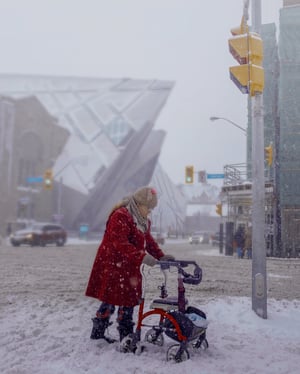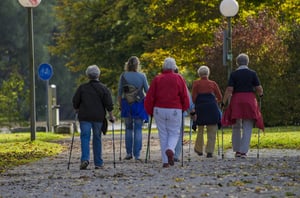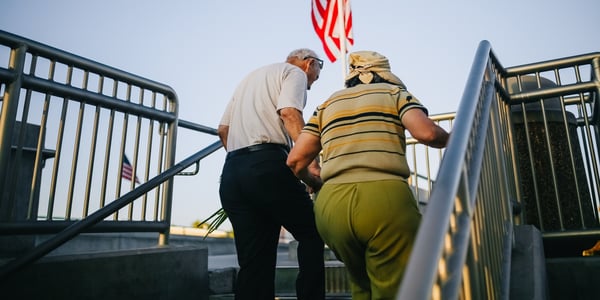The headline says it all: "Ivana Trump, ex-wife of former President Trump, died from fall: Medical...
9 Safety Tips to Prevent Falls
As we age, falling becomes a significantly greater threat to health. An act that, years ago, might have been met with a laugh now must be taken more seriously. Interestingly, the causes of falls are often not dramatic and uncommon events. Frequently, falls result from small and everyday occurrences that we ignore and even consider insignificant in and out of the house, such as wet floors, scattered items, or a ruffled floor rug. However, merely watching your step closely is not always enough to prevent a fall. Health-related matters also contribute to falling, such as impaired vision or new medications.
A simple fall can cause severe complications for older adults. Common problems include bone fractures, hip fractures, dislocations, head injuries, and even depression resulting from injury or fear of falling again. As stated by the CDC, falling once doubles the chances a second fall will occur.
Thus, if you are concerned about the possibility of experiencing a fall, you are not alone! It is essential to learn how to prevent falls. That's why we've compiled the following tips to help keep you safe and minimize your chances of an unfortunate fall. First, let's take a look at the major causes of falls:
- Chronic Health Conditions
Seniors living with chronic health conditions are more susceptible to falls. According to the National Council on Aging (NCOA), about 80% of seniors have at least one chronic disease. These can cause falls by increasing inactivity, loss of function, depression, use of multiple medications, and pain.
- Environment
Many older adults are living in houses they have owned for many years. However, the houses may not have been designed and purchased with aging in mind. Homes must be built or adapted to keep residents safe in every room and at every step.
- Medications
Some medications, especially over-the-counter (OTC) drugs, come with unintended side effects. These could include dehydration, weakness, and dizziness.
- Vision
As we age, so do our eyes. Because of this, noticing obstacles and hazards along the way becomes difficult. Click here to learn more about taking care of your eyesight!
- Balance
Loss of balance is a major cause of falls. It results from the loss of body coordination and flexibility caused by aging.
Awareness of what causes adults to fall is helpful, but what steps can you take to minimize your chances of falling? Read on for tips to prevent falls:
Follow These Tips to Prevent Dangerous Falls!
-
Book an Appointment with Your Physician
Before implementing any fall prevention tips, booking an appointment with your physician is the first critical step. Familiarize yourself with the following questions your physician will ask:
-
Do you have an underlying medical condition that could cause a fall?
Certain underlying medical conditions could increase the likelihood of you falling, especially those related to ears, eyes, and the lower body.
-
How well or comfortably do you walk?
Further, you will have to mention symptoms like shortness of breath, joint pain, and dizziness you might be experiencing when walking. Finally, there will be an evaluation of your body balance, muscle strength, and movement.
-
Have you ever fallen?
You will have to answer if you have fallen before and how many times. This will include detailed descriptions of your falls and their causes. Further, you will have to mention nearby falls that could have been damaging if you had not been caught. This will include those instances in which you saved yourself by grabbing something sturdy close to you. When you give such details, among others, your physician will be able to come up with custom fall prevention techniques just for you.
-
What medications are you taking?
If you are taking any prescriptions, be sure to mention these. Also, don't leave out any OTC and supplements that you are taking. Alternatively, you can simplify this task by bringing along the prescriptions, OTC, and supplements to the doctor. It's important to note that the doctor may advise you not to continue with some medications that cause weakness and dizziness.
-
-
Utilize Assistive Devices
 Assistive devices help provide the extra effort and balance you need to keep yourself from falling. Common devices include walkers and canes, which help improve stability. Assistive devices also include:
Assistive devices help provide the extra effort and balance you need to keep yourself from falling. Common devices include walkers and canes, which help improve stability. Assistive devices also include:-
Installation of handrails on stairways
-
Raised toilet seat and grab bars
-
Non-slip treads on slippery floors
-
Installing grab bars in the shower room or close to the tub
-
A sturdy seat in the shower
-
-
Improve Lighting
Proper lighting is crucial. Remember, as we age, the eyes also age. Thus, they lose their ability to focus and adequately sense light. Therefore, you need to ensure your home is appropriately lit and bright enough for you to spot a small object on the floor without straining. To do this effectively, consider the following:
-
Place the lamp switch in your bedroom within reach. This will be handy if you are to wake up in the middle of the night when the room is dark.
-
Install night lights along with the hallways, bathroom, and bedroom.
-
Place flashlights in strategic places around the home. You can have one in the kitchen, bedroom, bathroom, garage, and living room. Ensure you keep them where you love to spend time.
-
Ensure your stairway lights are on whenever you are going up or down.
-
Install light switches in a location with clear paths. Consider using the glow-in-the-dark switch that's easy to spot.
-
-
Remove Clutter and Hazards
By removing clutter, you will reduce the likelihood of tripping and falling. Do this in your kitchen, living room, bedroom, hallways, and entrance. If you haven't done this recently, consider getting help from your family members. Do not strain yourself too much. That said, consider the following tips to do this properly.
-
Ensure the mats you are using all over the house are non-slip.
-
Always immediately clean after spilling any fluid on the floor, whether it's grease, water, juice, or anything else.
-
Neatly organize your food, dishes, and clothing, among other necessities. Keep these items off the floor and out of the way, even the dirty laundry!
-
If you notice any loose part of the floor, whether it's wooden, carpet, or tiles, have it repaired immediately. Until it is fixed, place bright-colored tape on the spot or something that will remind you not to trip over it.
-
Use slip-resistant backing, tacks, or double-sided adhesive to secure loose carpets and rugs on the floor.
-
Organize congested areas in the room by removing furniture or other accessories you don't need.
-
Keep your walkway free and clean. This means you should remove things like phone cords, cables, newspapers, electrical cords, and boxes.
-
-
Wear proper shoes
You need shoes with a strong grip to hold firm on any floor, whether it's watery, icy, or muddy. This means you should avoid shoes with high soles, wedges, high heels, or floppy slippers. These kinds of shoes encourage tripping or slipping on the floor. Walking in just socks also makes you susceptible to falling.
Therefore, remember always to wear non-slip and sturdy shoes to prevent yourself from falling. Proper shoes will also protect your ankles and other joints from pain.
Read our blog: Safe and Comfortable: Shoe Shopping Guide for Seniors! -
Increase Physical Activity

Physical activity enhances your balance and safeguards you from falls. However, don't engage in any additional physical activity until your physician gives you the green light to do so. Consult with your doctor first on the types of activities you can engage in without causing harm.
Common activities include swimming, walking, and yoga, among others. The exercise should be gentle with graceful motions to ensure you don't dislocate any joints or cause injuries.
Those who fear physical activity due to the risk of falls should contact their physicians. The physician will advise them on the right types of exercise to engage in without injuring themselves. -
Maintain Proper Health Practices
Aside from your environment, there are several health-related things you can do to ensure you are giving yourself the best chance of avoiding falls in the future. This includes:
-
Consume foods rich in Vitamin D to enhance your muscle and bone strength
-
Get an annual eye exam
-
Check for osteoporosis
-
Only take the necessary medications
-
Reduce Alcohol Consumption
Keep in mind that alcohol negatively affects your balance. Therefore, you need to reduce alcohol intake to avoid damaging your reflexes and balance. Further, studies have found that alcohol contributes to bone fractures in seniors.
-
Stand Up Slowly and Carefully
Avoid hurrying when getting up from a sitting position. This will prevent a rapid drop in blood pressure that can cause a dizzy feeling. Additionally, it will reduce the likelihood that a sudden or unexpected pain will occur and interfere with your ability to complete the movement.
Seek assistance from your loved ones in ensuring your surroundings are safe to stroll without worrying about falling. Further, stay active through manageable physical activities like walking, stretching, or any exercise that will keep you physically active. In case a fall does occur, the first step is to seek medical assistance. Go for a check-up immediately to ensure you are safe and sound. Lastly, keep in mind the above tips will only assist you when you practice them all regularly. With that, enjoy your home and the outdoors safely!
Let us know in the comments below - what has helped you prevent a fall?
Additional Resources Related to Fall Prevention:






